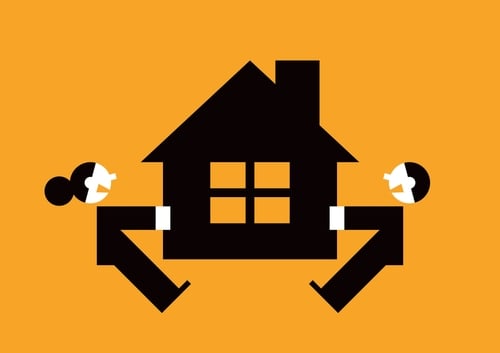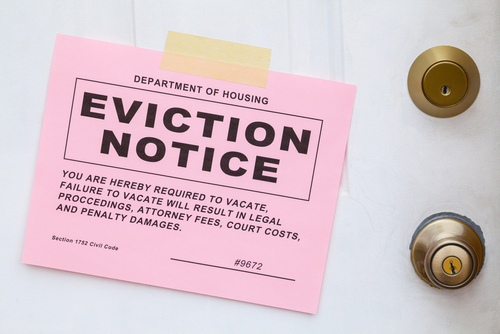
The Center for Disease Control and Prevention (CDC) once again extended the national ban on evictions. What was supposed to expire on June 30th has now been pushed to July 31, 2021. In a statement made June 24th, the CDC said that this was intended to be the final extension of the orders meant to protect vulnerable tenants from the risk of infection due to eviction. So, while tenants have another temporary stay thanks to the CDC eviction ban, landlords are left with many questions. What does this new extension mean? Who is protected? Join us below to discuss the next steps for landlords.
Who Does the CDC Eviction Ban Protect?
The CDC eviction ban protects tenants from eviction for non-payment of rent under the premise that these evictions could exacerbate the public health crisis. While that may be, tenants affected by the pandemic owe a collective $40 billion in back rent across the county. The orders specify that those protected under the ban must meet certain criteria below –
- Tenant(s) made every effort to obtain any available government assistance for rent or housing.
- The tenant(s) earned less than $99,000 as an individual or $198,000 jointly for the 2020 tax year.
- Tenant(s) anticipate earning no more than $99,000 in annual income as an individual, or $198,000 jointly in 2021
- An individual who was not required to report any income in 2020 to the IRS or received an Economic Impact Payment
- Tenant(s) who are unable to pay the full rent due to a substantial loss of income, loss of compensable hours of work or wages, a lay-off, or extraordinary out-of-pocket medical expenses
- Tenant(s) are using best efforts to make on-time partial payments as close to the full amount as the tenant’s circumstances allow (considering other nondiscretionary expenses)
- An eviction will likely force the tenant(s) to live in close quarters or render the tenant(s) homeless due to no other available housing options.
That said, this protection is not automatic for qualified renters. In fact, under penalty of perjury, tenants must submit a downloadable CDC Eviction Ban Declaration Form to their landlord. In addition, for those tenants not protected under federal orders, individual states and jurisdictions may have additional protections landlords must be aware of. For help navigating these confusing times, check out the frequently asked questions on the moratorium page for added guidance.
 The CDC Eviction Ban Fight in the Supreme Court
The CDC Eviction Ban Fight in the Supreme Court
The CDC eviction ban affects every party in a rental transaction. For tenants, it offers a reprieve from eviction but is only temporary. On the other hand, landlords are left scrambling to stay afloat however they can. In recent months, some landlords and real estate agencies have challenged the orders in court, saying the CDC overstepped its authority. Essentially, these cases say that the government does not have the power to regulate the landlord-tenant relationship in this manner.
In the nation’s capital, a group of landlords decided to challenge the CDC eviction ban citing the orders “will prolong the severe financial burdens borne by landlords under the moratorium for the past nine months,” one property owner said. On May 5th, they succeeded when a federal judge ruled that the orders exceeded CDC authority. That said, the decision was held for appeal, and on June 29, 2021, the Supreme Court voted to uphold the CDC eviction ban. While no official statement was released, Justice Brett Kavanaugh wrote in a concurring opinion that he based his vote on the fact that the ban will end in a few weeks. That time further allows nearly $46 billion in delayed congressional funding to make its way to those in need. That said, he did add that “in his view, Congress would have to pass new and clearer legislation to extend the moratorium past July 31.”
Tips for Filing Evictions During a Moratorium
Little federal relief or protection from landlords has left many to become creative in finding ways to find relief. Even though the CDC eviction ban does not allow non-payment evictions, other types of evictions can proceed. Check out these legal reasons to file for eviction despite the moratorium below –
Reasons to Legally Evict a Tenant – Even in a Pandemic
- Tenant(s) Engage in Criminal Activity.
- The Resident(s) Threaten the Safety or Health of Other Residents or Neighbors.
- Remaining in the Property Poses a Significant Risk of Property Damage
- Tenant(s) are Violating Health Regulations, Building Code, or Other Regulations that Affect Health or Safety
- The Tenant(s) Violated the Lease (excluding non-payment of rent or fees)
- Tenant Holding Over
Looking for advice on filing a holdover eviction during the CDC eviction ban? Check out our blog.
Tips for Landlords Navigating the CDC Eviction Ban
 With the extended CDC eviction ban and court challenges, navigating what to do next can be confusing. After all, these are unprecedented times for everyone. However, following the law is critical to avoiding costly fines and legal action. While there is no easy fix, check out these tips below to help deal with the eviction ban –
With the extended CDC eviction ban and court challenges, navigating what to do next can be confusing. After all, these are unprecedented times for everyone. However, following the law is critical to avoiding costly fines and legal action. While there is no easy fix, check out these tips below to help deal with the eviction ban –
- Communicate with Your Tenants
- Help Tenants Get Available Aid
- Work Out a Payment Plan
- Sue for Rent Instead of Eviction
- Seek All Other Qualified Evictions
- Consult a Qualified Attorney
- Hire Professional Property Managers
Communicate with Your Tenants
It is hard to help if you are not sure of the situation. So, if a tenant is missing payments, reach out and see what is going on. They may be facing job loss or other mitigating circumstances that can help you determine your next steps.
Help Tenants Get Available Aid
Landlords need to be paid, and some tenants need help paying. While many would agree aid has fallen short, nonetheless, it may be there to take advantage of. As the landlord, be sure your tenants know what assistance may be out there, such as the Virginia Relief Program.
Work Out a Payment Plan
Eviction is not always the best thing. If you have an otherwise great tenant who has fallen on hard times due to the pandemic, it may be advantageous to work with them. If you are able, consider drafting up a payment plan. That way, you receive some income, and they can more effectively catch up on back charges while avoiding a court eviction.
Sue for Rent Instead of Eviction
Under current orders, landlords cannot evict a tenant for non-payment. However, the tenant owes the back rent regardless. So, if a payment plan or other methods do not work to recoup rental income, consider suing for rent in small claims court.
 Seek All Other Qualified Evictions
Seek All Other Qualified Evictions
The CDC eviction ban does not allow landlords to evict based on the inability to pay due to the pandemic. Although non-payment is the most common reason for eviction, other types can go through now. So, check your local jurisdictions’ guidelines and file eviction on other grounds if warranted.
Consult a Qualified Attorney
For the average person, navigating the law at regular times is a challenge. That said, we find ourselves in unprecedented times. Therefore, landlords need to understand their rights, responsibilities, and obligations fully. So whether you need answers on a particular situation or general advice, contact an experienced real estate attorney.
Hire Professional Property Managers
Eviction is a legal process with many steps and procedures to follow carefully to achieve a good outcome. In addition, communicating with tenants during this time can take considerable time to work through issues. So, why not pass that responsibility on to a professional. Experienced property managers know how to navigate communications and applicable laws while protecting both tenants and landlord interests.
Whether landlords need to handle the CDC eviction ban or normal daily operations, keeping a rental business afloat is a daunting task. At Bay Property Management Group, we understand that effectively managing a rental means a landlord’s financial wellbeing is at stake. So our team works tirelessly, using the latest technology and trusted expertise, to develop solutions that balance the needs of both tenants and landlords.
So, if you need time-tested industry advice from a team of property managers in Northern Virginia, give Bay Property Management Group a call today. We offer full-service property management throughout Northern Virginia, Central Maryland, Washington DC, and the greater Philadelphia area.

 The CDC Eviction Ban Fight in the Supreme Court
The CDC Eviction Ban Fight in the Supreme Court Seek All Other Qualified Evictions
Seek All Other Qualified Evictions